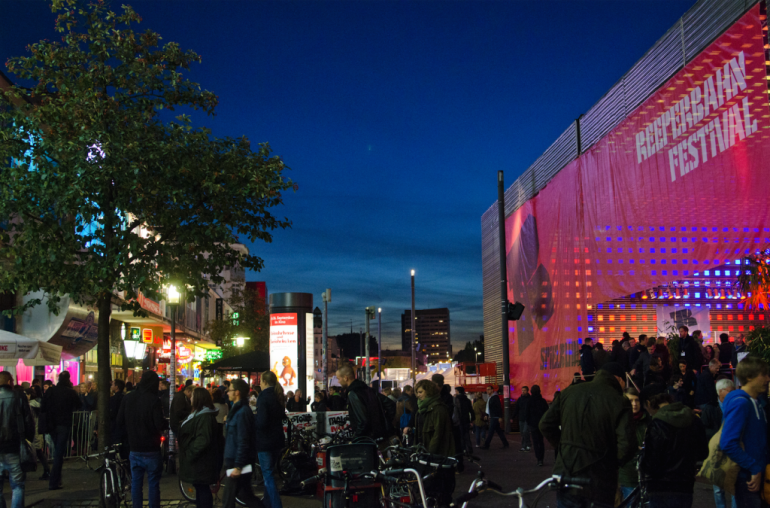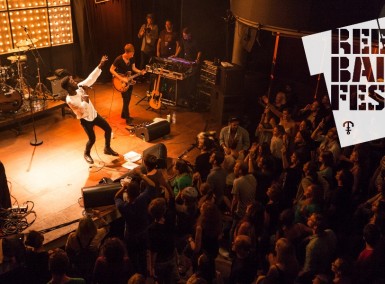
Photo by Nina Zimmermann
Hamburg’s Reeperbahn Festival is celebrating its 10th anniversary! We sat down with the festival’s founder Alexander Schulz to talk about the event’s history and changes over the years. But not only Reeperbahn Festival changed, also the entire music industry changed. The recording market broke together, the live market grew, production methods and listening behavior changed. An entire business that is in the middle of a major change. Let’s hope that at this year’s event at least some steps towards a brighter future will be taken.

Alexander Schulz, General Manager and Founder of Reeperbahn Festival GbR
(Photo: Inferno Events/Reeperbahn Festival)
Ten years Reeperbahn Festival. Did you ever think that the event will get that big and important? It surely started with a small idea?
Of course, I always believed that build up something that will last long, otherwise we would have never started with it. But that it ever gets that established, not only in Germany but also Europe, as an important marketplace for the music industry that wasn’t clear to me in the very beginning. We were definitely very lucky. We also had our problems, especially in our first year the problems were enormous.
Were do you see the crucial turning points of the last ten years?
Directly after the financially disastrous first year. We were very euphoric. The idea to start the Reeperbahn Festival came up when I’ve been to South By South West for my very first time in the year 2000. There I asked myself if something like this could also work in Germany. Of course, I also had a look at other cities in Germany, but there are clearly not that many cities that have so many venues so close to each other, so I decided for Hamburg’s Reeperbahn. At the same time the Reeperbahn also has an international status, in general, and also in the music history. Then we worked for six years on this idea and at some point you just lose the reality. So in the end we planned way too big with the first edition of Reeperbahn Festival. Too big in quantity and quality. This was a financial disaster, although we booked, compared to now, way more established artists in the years. So we corrected things completely, leveled many things down and went for a way smaller version with the second edition in 2007. We decided to only go for 14 or 15 venues with about 100 acts. In 2008, we took a little step up again and luckily reached the break-even the second year in a row. This was the first turning point, to go on with the event. We almost lost 400.000€ with the first event in 2006.
We learned what it means to have the kind of structure with which you always only have small venues. You can reduce some overhead costs, but the main costs, like sound systems, engineers, etc. you have at many venues. So the running costs are very high, simply because there are plenty of venues, no matter what size, and you have production costs everywhere. So we decided to go on and we knew that it will take us quite a while to recoup the loss we had. Decision number one was to go smaller. 2008 we decided to add an official delegates program during the day time. That was the second important turning point. We saw that especially people from the live music business visited the Festival anyway, so we decided to add a delegates program. We also decided for that because the music industry was about to change tremendously and there was a big need to talk about these things.
The focus went away from the recording industry towards the live industry.
If there was a third turning point then it was that we build up on all this and were able to keep up with the other industry events like MIDEM, Eurosonic Noorderslag, and The Great Escape. Of course we also slowly added the other markets and did not only focus on the live industry anymore. We added the publishing and recording business. Especially in the last years we worked hard on the publishing program since we see a big need in this field. We want that the next generation of the music industry feels well with us.
At the moment it looks like the live market is about to slowly break together. Festivals are not sold-out anymore and the live market is oversaturated. How do you see the current movements in the live market and how does this affect the Reeperbahn Festival?
We have to react to that in two ways. First as a festival and second as the platform that talks about the music industry. The second thing is a topic of our conference program. Many people saw this coming for quite some time. On the festival side as well as in the super busy months, autumn and spring, when almost every act is touring.
With our own event we realize that we are luckily not affected by all this. Fingers crossed that it will stay like that. But we again had more ticket pre-sales than last year, on the festival and conference side. We might be lucky since we are outside of the regular festival season. Also we are not a standard festival because we have plenty of indoor locations. So luckily we have a great surrounding and timing that makes our festival, so far, not affected by the problems.
‘…there are also no established new structures yet.’ (Alexander Schulz)
How do you see the music industry in general at the moment? The recording industry pretty much broke together, the live market is oversaturated, the publishers also don’t want to take risks. Who helps the great small artists and builds them up?
It would definitely be wrong to run after the old structures, but the hierarchical A&R structure of the last decades at least worked as some kind of curation or filter. These curators decided to work together for three or five years and tried to build something up. This changed completely. Actually the live industry should take on more responsibility for the development of artists. This can only be done by the live promoters and live agencies. But the problem is here that no one is used to work together for a long time, since this part of the industry used to an appendix to the recording industry. There is always the fear that the artists might decide for another agency at some point. So at this point it sadly doesn’t seem to be an option, because long-term agreements are not usual in this field yet. But hopefully it will happen in the next years that artists and live agencies decide to work together for a longer time. The agencies are the ones who should invest into artists and develop them.
So on the one hand we don’t want the old structures back, but there are also no established new structures yet.
At the same time there are also not many artists with strong personalities out there at the moment. We need artists that have to say something on important matters, who are taking a position, and who are able to be out there longer than just a few years. We need artists that are willing, able, and strong enough to really move people.

Reeperbahn Festival – Photo by Lisa Meyer
This year’s Reeperbahn Festival has a focus country for the very first time. How come that you decided to set a focus on Finnish music?
Actually we never wanted to focus on a single country, since we hold the opinion it’s something unmodern. We always said that it’d be more interesting to focus on a city or a Metropol region. Of course, these are all ideas that we have on mind for the next years. But this year we decided for a country focus since Finland came to us and we saw their amazing work over the last years. We saw many great points that make sense for both sides, so we decided to go for it. Let’s see how the focus topic will develop in the next years.
But on a different level it is important to say that only artists from countries with strong music export offices (mainly Scandinavia, France, Canada, etc) get spotlighted. What about artists from other countries, for example South and East Europe. There are many great artists that don’t get the chance to get spotlighted.
Sadly that’s true, artists from South and East Europe are completely underrepresented at showcase festivals. The North European countries went for ‘cultural export’ very early, other countries started with this later, but many countries are still not active in this field. It is clearly a political matter to take care of their artists and to support them. Especially because music is something that can influence the overall image of a country. A good example might be Iceland, a small country in the very North. But the reason why their tourism started to boom at some point was the international success of Icelandic artists like BJÖRK or SIGUR RÓS. It is the emotional image transfer that countries should see too. So it is something on the political level because at an early point of their careers artists need support, and for showcase festivals it is financially sadly not possible to fully take on this responsibility.
At the same time it is important to say that no music export office can come to us and tell us which of their artists they want us to book. We always curate the bookings, but, of course, we work in collaboration with the export offices.
One last question: how do you take care to stick with your ideals and the reasons why you started the Reeperbahn Festival? I can imagine that after ten years, so many changes, and the way bigger team you work with now it can potentially happen to ‘lose yourself’ in some points. How can you guarantee that the Reeperbahn Festivals every year over and over again sticks with its ‘showcase characteristics’?
You are right, this is definitely something that is important to take care of. At the moment this all is still happening very intentionally. I think we only can deal with this with our taste and by curating hard. At the same time you are totally right, we decided for bigger artists at some points, we decided to go for a country focus. So yes, there are points where we went away from our original ideas and ideals. But so far we still did that in a way that it made sense to us and we can justify it to ourselves.
––
Reeperbahn Festival on NBHAP
Reeperbahn Festival Homepage



